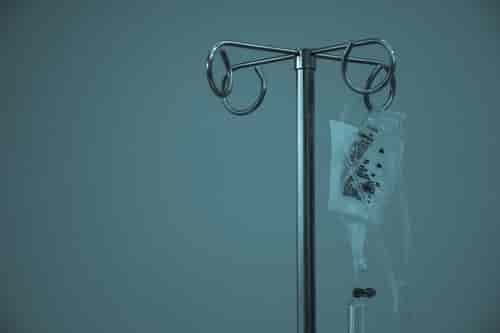I remember lying in the hospital bed during my last medical admission scared, angry and alone but most of all exhausted.
Mentally, physically and spiritually exhausted in a way I’ve never experienced again and hope I never will.
I felt unseen, I felt as though I couldn’t do anything right, I felt I was being threatened at every turn and treated less than human when all I was trying to do was be compliant and do the right thing.
I remember having the thought about treatment as clear as day. “There’s got to be a better way”.
Now I know that better way.
Now, miraculously I am a part of bringing that better way into existence, into reality so that those people who are currently and those people who will in the future need medical treatment for an eating disorder can experience less trauma, less pain and more treatment and more safety.
For the past couple of years, I’ve been involved in speaking at different hospitals and health services in person and via Zoom sharing my experience with the medical treatment I received during the 15 years I lived with anorexia nervosa. It is something I couldn’t have imagined in a million years I would be doing, and I feel an overwhelming sense of gratitude each time I speak because I know I am giving a voice to past me who didn’t yet have one and to all those who are yet to develop theirs.
In this blog I am going to share my answers to 5 of the most common questions doctors, nurses, dietitians, psychologists, and psychiatrist ask about my recovery during these trainings and speaking events.
Beginning with…
- How Do You Battle with Your Thoughts on Bad Days Now?

I don’t.
When it comes to eating disorder thoughts there is no battle.
Because they are no longer there.
It would actually be a battle to bring those thoughts back and to do those harmful behaviours that once came so naturally.
I have other internal conflicts in life related to living a rich life that is filled with work, family, friends, study, business and play. I have other sad and frustrating moments related to being a human being. Parts of me may want to stay late at work to get a little extra done and parts of me may want to get home to make a nice dinner for my partner and me.
I have to make many decisions, but I wouldn’t think of them as battles.
I learnt and developed the ability to know myself and when you know yourself, you’re able to trust yourself and when you trust yourself there is no battle.
I am no longer in conflict with myself because I am whole. I am no longer in conflict with myself because I accept and listen to all parts of me as valid and useful. I am no longer trying to pretend or shame myself that it should be any other way than what it is. If I don’t know something I find it out.
I am learning, growing, failing, doing life and with non-judgemental curiosity I embrace the true freedom from internal battles that freedom to be less than perfect brings.
2. Did You Understand What You Were Doing Was Bad for You?

Yes.
It’s still a surprise when I get asked this question because to me the answer is of course. Of course, I knew.
I knew better than any doctor or medical professional could tell me.
After all I was the one experiencing the enamel disappearing from my teeth, the heart palpations, the dizziness, the reflux, the bloating, the nausea, the pains in my intestines, bones, joints, muscles, the exhaustion, the fear, the panic attacks etc.
I’d researched what having a low pulse, low blood pressure, low temperature, poor bone density, electrolyte disturbances and irregular heart beat all meant.
I knew my body was struggling.
I knew my body was sacrificing parts of itself in a desperate attempt to just stay alive.
Sometimes in the night I’d run my hands quickly over the cold skin just barely covering bones. I’d place my hands on my heat and in fear I’d make all sorts of bargains with God (I’m not even religious…) that if I made it through tonight, if I woke up in the morning I’d do better. I’d try harder. I’d be better.
I was, like many of the people I work with who are in recovery from anorexia nervosa, highly intelligent and well researched.
I knew.
It just didn’t matter that I knew.
I couldn’t translate the knowledge I had into doing anything differently. At least not for long periods of time and that is what matters.
Why not? Because it always felt inherently wrong to treat myself well.
It felt wrong at the cellular level.
It felt wrong at the molecular level.
It felt wrong right down into the very core of my being.
I had all sorts of reasons for why it was wrong to care for myself, why it was wrong to eat.
I wasn’t enough.
I wasn’t worthy.
I wasn’t loveable.
I didn’t deserve it.
The unfair truth that I can see so well looking back is none of it was ever true, but I felt it was true.
And if being a clinical hypnotherapist has taught me anything it’s that when there is a conflict between our emotions and our logic, our emotions win out.
It was true to me. Therefore, it was true.
Consider the case of many of the people I work with today who want to give up smoking. I’ve not worked with anyone who didn’t know smoking was bad for them, who hadn’t had a doctor explain all the health risks and consequences of smoking, who wasn’t often already experiencing some of the harms or who didn’t feel guilty when they took time away from their kids or grandkids to have a ciggarette.
They know.
And just like when I was in the midst of the eating disorder they know it better than me.
When a habit is operating at the unconscious level it doesn’t matter how much education we recieve that shows us we should change. We’re not changing until we change at the level the problem is operating. The unconscious level (i.e through clinical hypnotherapy or NLP).
You cannot educate someone out of an eating disorder any more effectively than you can educate someone out of having a broken knee.
They need treatment and treatment may include some education but education alone is not going to heal them.
3. I See the Same Patients Come Back to Hospital Regularly, it’s as If They Want to Be There?

Hospitalisation with an eating disorder is regularly stressful for the people who go through it.
If you’ve experienced hospitalisation with an eating disorder it’s likely you’re scoffing at my use of the term “stressful.” It’s not accurate. I know. There are no words I can find to describe my experience with hospitalisation with anorexia nervosa.
You do not want to be there.
All the control and any sense of autonomy over yourself and your life is taken out of your hands.
Every means you have of coping in this world is taken away from you all at once.
You have someone with you 24/7 including when you’re showering or using the toilet.
It is confusing.
It is dehumanising.
It is terrifying.
It is, in all honesty traumatic.
But and this is a big but…
It is also a relief.
It is a relief to have everything taken out of your hands (because if you’re being hospitalised with an eating disorder let’s face it things were not in your hands).
It is a relief to have someone else telling you what to eat and holding fast to that when every inch of your body wants it, and every inch of your body is screaming that it doesn’t want it.
These two experiences of hospitalisation with an eating disorder can occur simultaneously.
I can tell you from experience that when you are living with an eating disorder there is no break. It is a relentless 24/7 war within yourself and hospitalisation as much as you don’t want it, parts of you are grateful for it.
It does not need to be one or the other.
So, yes you will have some people who parts of them know that hospital is a good thing because they get told what to eat, they get food presented to them and they have to eat it, they know that in here they cannot exercise or hurt themselves in the ways they can on the outside and that’s a relief.
There’s another component to the answer to this question regarding the multiple hospitalisations people in recovery from eating disorders are well known for experiencing and that is that people continue to need medical treatment for their eating disorders.
For the simple fact that they haven’t developed their own abilities to not do the behaviours that lead them to end up medically unstable again and again (and again and again). Without a way to stop doing those harmful behaviours and a way to start doing healthier behaviours there is only one path people will take.
Hospital admission with an eating disorder offers no treatment beyond medical stabilisation. It’s important to know medical stabilisation is the role of hospitalisation, not recovered. It is up to you to seek outside treatment.
Summary

When it comes to the treatment of people with eating disorders, we’ve come a long way. There is no denying this.
However, the story people who end up in my office share about their experience with the current medical models’ treatment of eating disorders is all too often one of pain, frustration, fear and outright trauma.
One that should have been therapeutic and beneficial but instead left them reeling and untrusting towards medical professionals.
It’s all too often an experience that leaves them disillusioned with the medical system’s ability to help, questioning the kindness of human beings in general and their desire to be a part of such a world.
That’s horrific and breaks my heart every time I hear these recounts because it does not need to be this way.
It could so easily not be this way.
So, if you are a medical professional treating people with eating disorders or know someone who is please read or share this blog. Please look for more resources outside of 30-year-old textbooks and outdated lectures.
Look to real life examples of people who’ve been there and recovered. Learn from them as to what helped and harmed. Those who’ve been there will always be your greatest teachers.
Most of all communicate with your patients, you don’t have all the answers, they don’t have all the answers but if you want to be their teacher allow them to be your teacher.
With my whole heart I hope you found this information useful and inspiring.

Become Great. Live Great.
Bonnie.




2 thoughts on “How Do You Battle with Your Thoughts on Bad Days Now? My Honest Answers to 3 Common Questions Health Professionals Ask Me About My Recovery from Anorexia Nervosa”
This was really helpful. 25 years all kinds of hospitalisation including one with bub in tow. Finally deciding enough is enough and hopefully getting some NG feeds happening at home to boost my body and brain and fight this once and for all without the trauma of hospital. The best part it I’m putting my hand up for it.
Aw Fiona I’m so happy to hear this was helpful. It sucks beyond words to go through this and to know by sharing helps one other person increase their care for themselves and feel less alone is wonderful – even better that it is you beautiful woman.